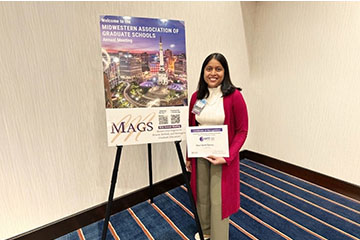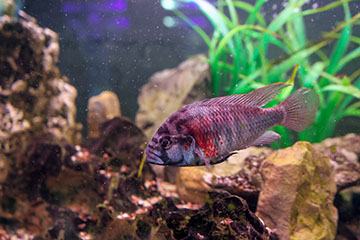Graduate student wins award for research on mussels
Nicole Vellequette placed first for Best Student Poster at the Freshwater Mollusk Conservation Society Symposium
Nicole Vellequette, a graduate student studying conservation biology, won first place for Best Student Poster at the Freshwater Mollusk Conservation Society Symposium. Her poster titled “Unionid assemblage and habitat assessment after major dam failures in mid-Michigan” displayed her research on native mussels in their natural habitat after dam failures in 2020. The co-authors on the poster are research tech Ava Laszlo, research associate professor Daelyn Woolnough, and professor David Zanatta, all in the Department of Biology.
She helped survey native mussels by snorkeling and assisting scuba divers from the Woolnough and Zanatta labs. Then, along with the poster’s co-authors, Vellequette analyzed the communities of the native mussels. They considered the density of invasive mollusks, mainly zebra mussels, and these species' risks to the native mussels. Also, they found where the native mussels’ natural habitats belonged in the lakes.
The research was conducted in Gladwin and Midland's Secord, Smallwood, Wixom, and Sanford lakes which were created, along with four dams, to create hydro-electric power. When the dams failed, they changed the aquatic habitat in the lakes. Mussels are important to the health of aquatic systems because they naturally filter water and provide habitats for other organisms.
Five species were found in Secord and Smallwood lakes, and thirteen species were found in Wixom and Sanford lakes. These findings show how important these mussels are to the conservation and health of the Michigan Lake system. They are a focus at the Woolnough and Zanatta labs where Vellequette conducted her research. The funding for the project came from the Four Lakes Task Force.
When looking for a lab to complete her graduate research, she wanted to find one conducting relevant and important research on freshwater organisms. Vellequette says, “Freshwater mussels are so important to our ecosystem and so understudied in the field of freshwater science.” She found the Woolnough lab and the Four Lakes project and wanted to contribute to important local research.
This story is brought to you by the Office of Research and Graduate Studies.




